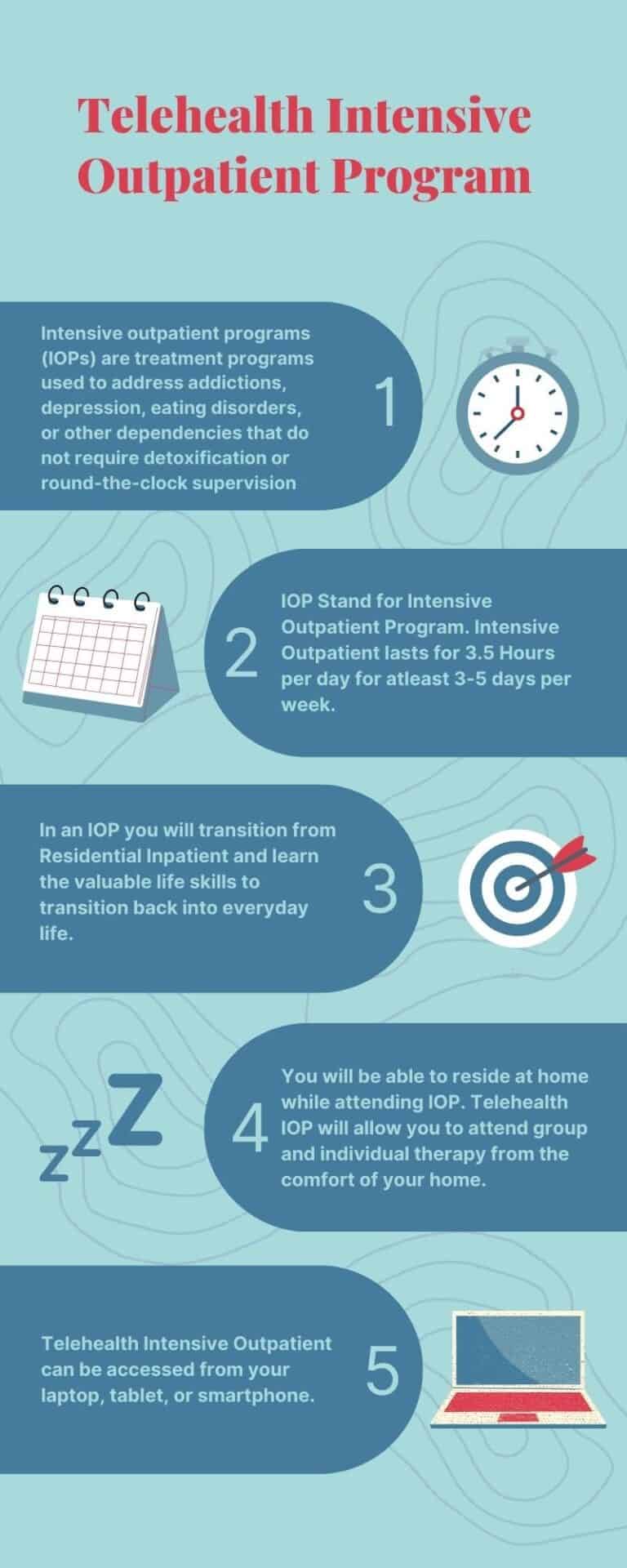Leading Factors to Take Into Consideration an Intensive Outpatient Program (IOP) for Mental Wellness.
Leading Factors to Take Into Consideration an Intensive Outpatient Program (IOP) for Mental Wellness.
Blog Article
Navigating the Intricacies of Twin Diagnosis Treatment Within an Extensive Outpatient Program Establishing
In the world of psychological wellness and dependency treatment, the intersection of twin medical diagnosis presents a nuanced difficulty that demands a comprehensive and tailored strategy. Within the boundaries of an Intensive Outpatient Program (IOP) setup, the complexities of attending to co-occurring mental wellness problems and material use problems need a fragile balance of competence and sources to navigate. The integration of evidence-based techniques, collective initiatives amongst multidisciplinary teams, and an eager understanding of the unique demands of each individual are crucial parts in effectively taking care of dual diagnosis within an IOP structure. By checking out the complexities of double medical diagnosis therapy within this intensive outpatient context, a more clear path arises in the direction of all natural and sustainable recuperation for those facing these linked challenges.
Dual Diagnosis Summary
What is the value of comprehending double medical diagnosis in psychological wellness treatment? Double medical diagnosis describes the co-occurrence of a material use problem and a mental wellness condition in a person. It is vital to identify and resolve this comorbidity as it can dramatically affect the effectiveness of mental wellness treatment. Without appropriate identification and monitoring of both conditions, individuals might have a hard time to attain long-term recovery and stability.
Understanding twin diagnosis is essential as it requires an extensive and incorporated technique to therapy. By recognizing the interaction between substance usage and mental health, doctor can customize treatments to meet the unique demands of each person. This holistic approach not just addresses signs and symptoms yet likewise targets hidden variables that add to the double diagnosis.
In addition, neglected double diagnosis can cause a cycle of regression and intensifying psychological wellness symptoms. By recognizing the intricacy of dual diagnosis and providing specific treatment, health care experts can sustain individuals in achieving long-lasting recovery and enhanced psychological health.
Tailored Treatment Plans
Identifying the intricate interplay in between material usage problems and mental wellness problems, the growth of tailored therapy strategies is extremely important in resolving the complexities of twin diagnosis in mental health and wellness therapy. Tailored therapy plans are personalized techniques that think about the distinct requirements, difficulties, and goals of individuals facing double medical diagnosis. These strategies are made collaboratively by a multidisciplinary team of professionals, including psychiatrists, psychologists, social workers, and addiction experts, to guarantee detailed and integrated care.
Tailored treatment strategies usually involve a mix of treatments, drugs, and behavioral treatments that target both the compound use condition and the mental wellness problem at the same time. These strategies may include cognitive-behavioral treatment, dialectical actions therapy, medication-assisted treatment, individual therapy, team treatment, and household therapy, among other evidence-based treatments. By customizing therapy methods to individual scenarios, customized strategies can address the origin of twin medical diagnosis, promote long-term healing, and boost general top quality of life for individuals having problem try here with co-occurring conditions.
Integrated Treatment Technique

Furthermore, the social facet of integrated care entails resolving environmental aspects that might contribute to the growth or perpetuation important use and mental health and wellness concerns. This can consist of household characteristics, real estate instability, or absence of social support. By integrating social interventions like household therapy, employment assistance, and area sources, the treatment becomes more all natural and customized to the individual's specific requirements. Generally, an integrated care technique in double medical diagnosis treatment within an intensive outpatient program setup intends to give extensive, effective, and individualized like individuals facing co-occurring problems.
Obstacles in IOP Setting
In the context of twin diagnosis treatment within an extensive outpatient program, browsing the intricacies of co-occurring substance usage problems and psychological health and wellness problems offers significant challenges. Among the key hurdles in the IOP setting is the sychronisation of care between psychological health and wellness professionals and compound misuse experts to guarantee a thorough treatment strategy. This requires reliable interaction, partnership, and a deep understanding of exactly how these problems communicate and influence each other.
Furthermore, the fluctuating nature important usage problems and psychological health conditions adds an additional layer of intricacy - Intensive Outpatient Program (IOP). Clients in an IOP may experience sudden changes in their signs and symptoms or material desires, calling for prompt treatment and change of treatment methods. Balancing the intensity of treatment and assistance while permitting clients the flexibility to manage their daily duties can be a fragile stability to preserve
In addition, attending to preconception and resistance to therapy within the IOP setup can hamper development. Some people may be hesitant to reveal their double diagnosis or may feel ashamed, impeding their involvement in the restorative procedure. Overcoming these obstacles demands a supportive and non-judgmental environment that try this promotes trust fund and visibility.

Collaborative Professional Efforts

Joint efforts additionally encompass normal interaction and information sharing amongst employee to ensure a natural therapy method - Intensive Outpatient Program (IOP). This may involve situation seminars, joint sessions with the individual, or shared paperwork to track progress and readjust treatment strategies as needed. In addition, collaboration might include involving other health care professionals such as main treatment medical professionals or family specialists to provide alternative assistance to the individual. Inevitably, a joined front of specialists collaborating enhances the effectiveness of dual medical diagnosis therapy within an extensive outpatient program.
Conclusion
To conclude, effective twin medical diagnosis treatment within an extensive outpatient program setting needs customized treatment strategies and an integrated treatment strategy. Obstacles might arise in this setup, however collaborative efforts amongst professionals can aid browse these intricacies. By dealing with the unique demands of people with co-occurring mental health and substance make use of disorders, IOP programs can offer thorough and alternative treatment to support recovery and overall wellness.
Report this page